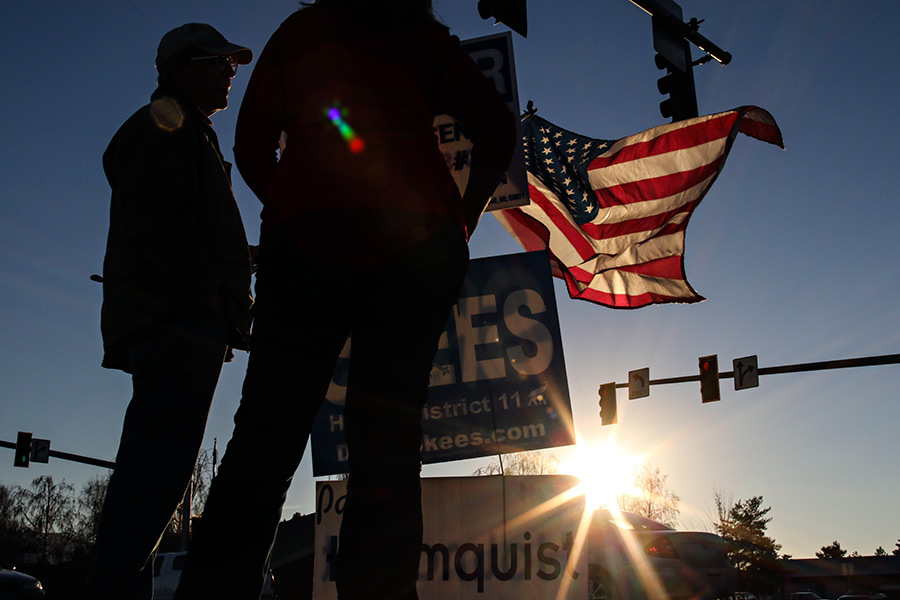After surveying the aftermath of the election, state lawmakers set to work electing party leaders to the Montana Legislature on Nov. 14, with Republicans calling for a more unified GOP than in that past two sessions and Democrats hoping to build inroads with moderate conservatives, who last session helped pass key legislation like Medicaid expansion, campaign-finance reform and the Flathead tribal water compact.
Despite the success of incumbent Democratic Gov. Steve Bullock, Republicans once again held serve across the state, maintaining majorities in both the state House and Senate for the legislative session that begins in January. The party picked up three Democratic-held seats in the state Senate, increasing their majority to 32-18.
Democrats expecting to make some advances in the 100-member House this election picked up five seats held by Republicans, but those feats were offset by the party’s loss of five Democratic seats, leaving the margin at 59-41 in favor of Republicans.
On Monday, the GOP elected Sen. Scott Sales of Bozeman as Senate president and returned Rep. Austin Knudsen of Culbertson to the role of House speaker.
Both Sales and Knudsen said that because of declining tax revenues, they didn’t anticipate much room in the budget for new initiatives.
The Democrats elected Rep. Jenny Eck of Helena and Sen. Jon Sesso of Butte as minority leaders in each chamber.
Eck said she’s holding out hope that Democrats will be able to work with moderate Republicans as they did in previous sessions to pass important legislation.
The intraparty divisions were evidenced in the state primary election, which featured a host of Republican contests as the splintered GOP battled for control over Montana’s Legislature, laying stake to what has become a battle for the GOP’s core.
The moderate and conservative branches of the GOP faced off in 10 Senate races and 26 House races.
In 2015, about a dozen moderate Republicans joined 41 Democrats to pass major legislation.
In the Flathead Valley, most conservatives prevailed, with the exception of Whitefish Democrat Dave Fern, who beat political newcomer Chet Billi in House District 5, and incumbent Zac Perry, D-Columbia Falls, who won his House District 3 reelection bid by 5 percent, beating Republican Taylor Rose.
Meanwhile, analysts noted that the race between Bullock and his Republican challenger, wealthy entrepreneur Greg Gianforte, did not align with the GOP rout in the presidential election among Montana voters, nor did it sync up with Montana’s U.S. House of Representatives contest between incumbent Rep. Ryan Zinke and Superintendent of Public Instruction Denise Juneau, both of which heavily favored the Republican candidates.
Rob Saldin, who teaches political science at the University of Montana, said while state Republicans are emboldened by their majorities, as well as by cleaning up in four of the five races for state office, they will continue to be cowed by Bullock’s executive leadership.
“Obviously things are going to be tougher for the Republican majority than if Gianforte had won, but a lot will depend on to what extent a coalition between Democrats and moderate Republicans exists,” Saldin said. “If we see that pattern continue, Gov. Bullock will be able to work around the Republican majority.”
Bullock also showed Montanans that he is not afraid to veto Republican bills, and during the 2015 session used his veto power more than any other recent governor.
The high-profile race for governor also drew more voters than did the presidential race between Democratic nominee Hillary Clinton and Republican Donald Trump, the eventual winner.
Around 15,000 Montanans, or roughly 3 percent of voters who cast ballots, skipped the presidential race, indicating the level of fatigue the divisive presidential race induced in voters statewide.
Only Vermont — the home of Bernie Sanders — saw a higher presidential under-vote of 7 percent, while 13 other states saw fewer votes in the presidential election than statewide races.
From the beginning, Gianforte faced an uphill battle against a sitting governor, and his attacks on Bullock never seemed to find purchase with voters, Saldin said.
“It is really hard to beat an incumbent. With few exceptions, like when an incumbent is embroiled in a scandal, it is just an enormous advantage. But Gianforte didn’t have that. He tried to hit him with scandals, but none of them caught on amongst Montanans,” Saldin said. “At the end of the day, it just didn’t amount to anything that would challenge the power of being the incumbent. As an aside, when you consider that Trump and Zinke won so many votes in Montana, and with the enormous Republican wave we saw on Election Day, I was surprised that Bullock hung on. And in fact, his margin of victory was even bigger than last cycle.”
Montana Republican Party Chairman Jeff Essmann said the upcoming session will be focused on a tightening state budget, and envisions a GOP devoid of the rifts that characterized the last two sessions.
“I’m anticipating a more unified GOP,” he said. “We are going to have a tight budget and we are not going to be passing any tax increases. My guess is that this will be a session that tends to focus on policy issues.”
